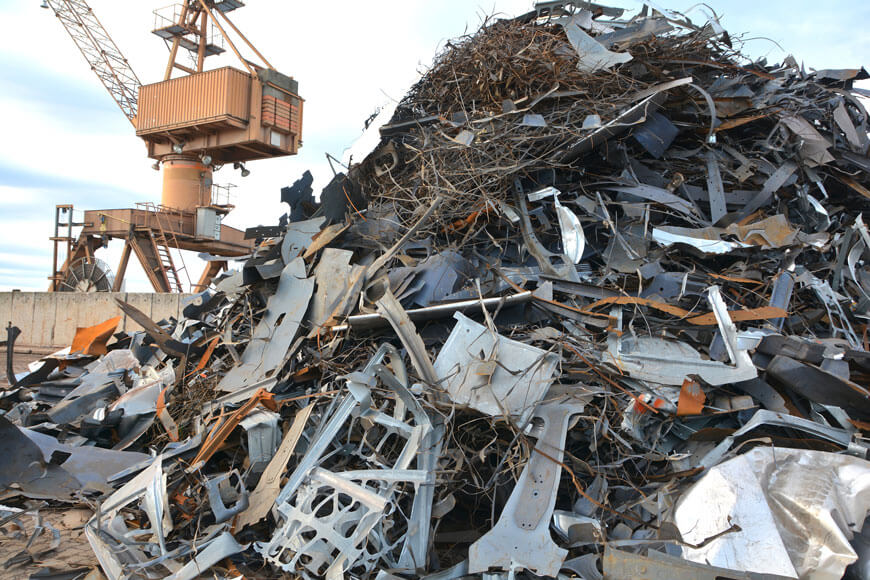In every nook and cranny of Nigeria, a burgeoning industry is taking shape, one that revolves around what some may perceive as discarded junk. Scrap metal, affectionately referred to as “Condemn Condemn” to encompass various discarded metallic items, is rapidly emerging as a highly profitable business across Nigerian cities and villages.
Nairametrics’ in-depth investigation reveals that these metal scavengers, often underestimated by society, are quietly amassing substantial monthly earnings, with some pocketing as much as N200,000. Astonishingly, this surpasses the monthly income of many bank tellers.
According to a report by minesandsteel.gov.ng, over 95% of Nigeria’s current steel production originates from scrap metal. This underscores the importance of developing the upstream mining sector in a nation blessed with extensive iron ore deposits. There are a total of 43 steel plants and fabricating outfits in the value chain, with 90% operating in the downstream sector, the report stated.
The implication is that the majority of Nigeria’s steel industry relies heavily on raw materials sourced from scrap collectors, shedding light on the profitability of the scrap metal trade.
The frequent theft of handrails from bridges and other metal fixtures on public facilities is another testament to the soaring demand for scrap materials.
Electric vehicles (EVs) are playing a significant role in driving this demand, as noted by chemical engineer Lekan Johnson. The electrification of transportation necessitates various metals for battery production, a substantial portion of an EV’s overall cost. Incredibly, some scrap metals salvaged from garbage bins in Nigeria eventually find their way to factories in major global economies.
Copper, among other metals, is experiencing an unprecedented surge in demand, with the International Copper Association projecting nearly a tenfold increase in copper demand from the EV sector by 2027. This surge aligns with the expectation of 27 million EVs on the road by 2027, up from three million in 2017, requiring a substantial quantity of copper for their batteries, wiring, and infrastructure.
For the metal scavengers in Nigeria, this escalating demand translates into newfound business opportunities.
Usman Mohamed, a former Bureau de Change operator who now serves as a middleman in the trade, shared that scrapped items encompass a wide range, from disused electrical appliances to vehicle parts, condemned generators, and even discarded refrigerators. Some of these materials are acquired at no cost on the streets or at dumpsites, while others are purchased at minimal prices and later resold to intermediaries.
These intermediaries, in turn, supply the materials to recycling companies, where they are melted and transformed into various valuable products like rods and pipes.
Nairametrics’ investigation unveils the birth of a thriving middlemen segment in the value chain. Many of the scavengers, often uneducated and unaware of the rising demand for specific materials like copper and aluminum, work under bosses who maintain direct relationships with recycling companies, capitalizing on this demand to generate substantial income.
One example is Babagana, a native of Kano State, who has been in the scrap metal business in Lagos for approximately seven years. Despite societal biases against scavengers, he has found it to be a highly profitable venture. He shared an example of purchasing a car engine for N40,000 from a customer and ultimately profiting nearly N20,000 by selling its components separately.
Babagana prefers not to stock these items due to the high cost of renting storage space in Lagos. Instead, he sells them to his boss as he acquires them daily. His daily profits typically range between N7,000 to N10,000, sometimes exceeding this amount. He remains optimistic about the business’s potential, especially with the emergence of more recycling plants in the country.
Scrap metal collection is not confined to urban areas; it thrives in states like Kaduna as well. The scrap metal collected by scavengers in one location finds a second life in another, as it is melted and repurposed into various items, including cooking stoves, farm implements, local pots and pans, and buckets.
In Abuja, the scrap metal business is booming, particularly among the youth. Many young entrepreneurs are turning to this trade to generate income and support their families. The entire ecosystem includes scavengers, middlemen, and dealers who collaborate effectively.
Materials like metals, plastic items, and abandoned cartons are in high demand and transported by middlemen to dealers. These dealers, in turn, sell the materials to various companies in Lagos and Kano, with some materials even being exported abroad.
While the scrap metal trade is not without its challenges, such as fluctuating metal prices, the risk of dealing with stolen metals, and discrepancies in material weighing, it remains a profitable venture for those involved.
As the demand for metals continues to rise, particularly in the construction and manufacturing sectors, this industry offers an opportunity for many Nigerians to earn a living and build sustainable businesses. Despite the lack of prestige associated with scrap metal collection, it has proven to be a viable and lucrative business that supports livelihoods and contributes to the nation’s economy.
A chartered accountant in Port Harcourt noted, “Therein lies another thriving industry that the federal government can leverage to increase tax collection,” stressing, “The industry is by all accounts a multi-billion naira industry.”


